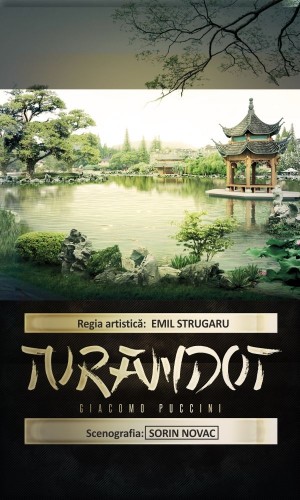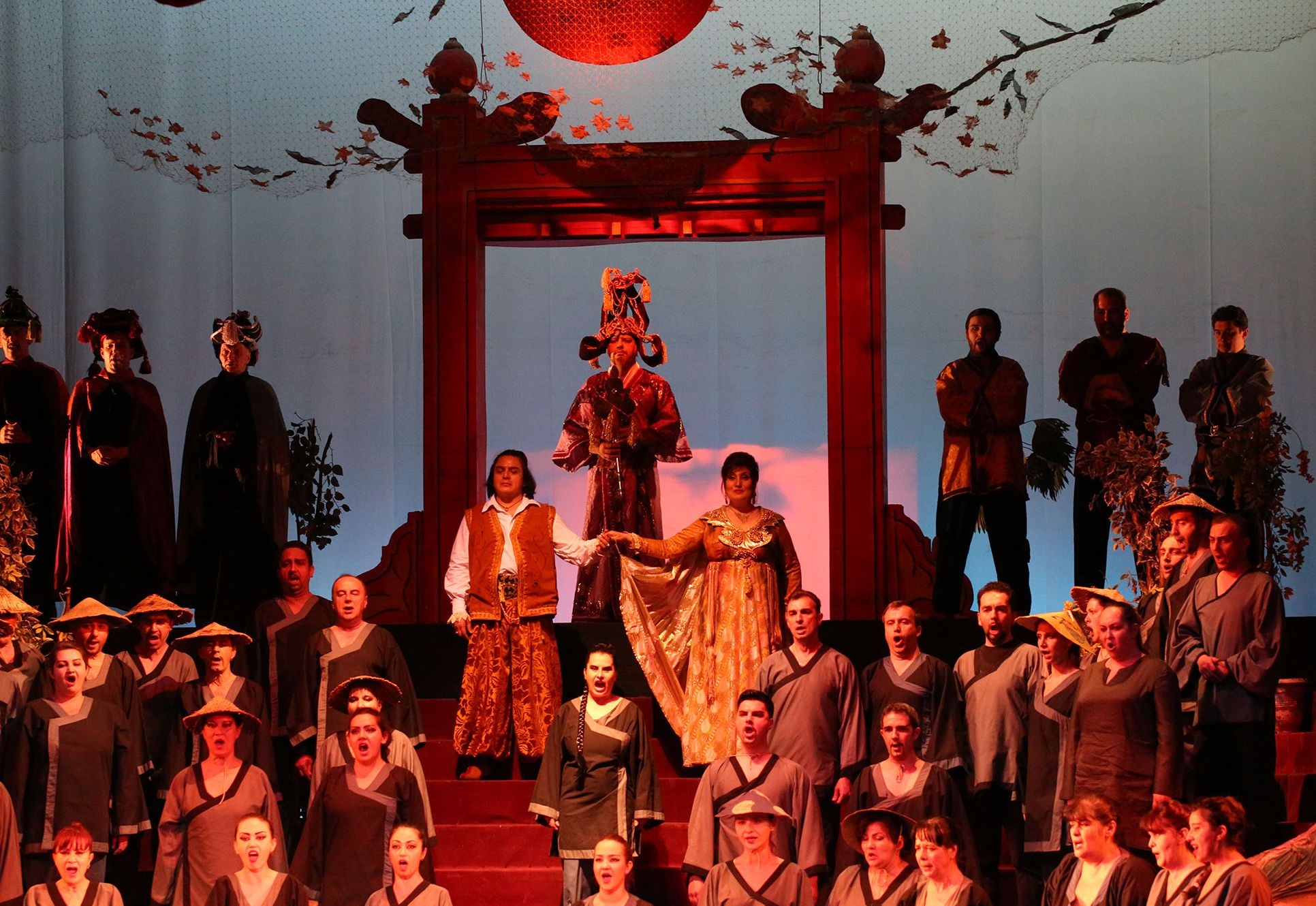Turandot
Giacomo Puccini

- World premiere
- Teatro alla Scala din Milano, 25 aprilie 1926
- Romanian Opera Craiova Premiere
- 5 iulie 1998
- Time Length
- aprox. 3h – două pauze
- Extra info
- Spectacol în limba italiană cu supratitrare în limba română
Opera in three acts composed by Giacomo Puccini. The score, left unfinished by Puccini, was completed by Franco Alfano.
Libretto by Giuseppe Adami and Renato Simoni, based on a play by Friedrich Schiller, based on a Persian fairy tale included in Carlo Gozzi’s collection 1001 days (the 18th century).
The action takes place in Peking (China), hundreds of years ago.
ACT I
A mandarin at the court of Emperor Altoum informs that the latter’s daughter, princess Turandot, will marry the royal pretender who will manage to solve her three riddles. The last one of the brave men who had tried his luck, won by the princess’s unique beauty, was the Prince of Persia. He was going to be beheaded, as it happened to the other men before him. The crowd gathered at the palace gates is waiting for his punishment. The people are gathered in groups, but they are brutally scattered by the imperial guards, who are trying to make room for the troops that are taking the Prince of Persia to the place of execution. In the agitation, an old man is pushed to the ground, and the small slave accompanying him cries for help to save her master. A young man runs to them; surprise and amazement overwhelm the three people. The old man actually was Timur, the dethroned king of Tartary, the father of young prince Calàf, who now was standing beside him! Fate had since long separated father and son, and this unexpected meeting brought a momentary happiness to the two men and to the young slave Liu. Impressed by the small girl’s loyalty and devotion, Calàf asks her why she followed her master to the exile. Her answer is simple, but striking: she was doing this because someday, a long time before, the young prince had smiled at her.
The brief appearance of Turandot, in the moonlight, acts as an all-powerful magic, forever subjugating Calàf’s heart. Madly in love with the cruel and beautiful princess, he rushes to the palace gates in fascination, trying to solve the riddles as well. He is surrounded by three buffoons – also ministers of the country – Ping, Pang and Pong, who try to stop him in order to spare his life.
ACT II
Scene 1
In a serene atmosphere, Ping, Pang and Pong remember the silence and picturesque landscape of their homes, of their native lands, which they miss and which represent the joy of their lives. In the imposing amphitheatre of the palace, the officials of the court are waiting for the commencement of the terrible examination of the unknown foreigner who had not been impressed by the previous victims, or by his father’s begging. An old hymn precedes the appearance of Turandot, beautiful and with the cold look of merciless idols (choir).
Scene 2
She explains to everyone why the young men who fail to solve her riddles are doomed to die: she is thus taking revenge for a great-grandmother of her kin, the beautiful Lu-Ling, who had been dishonoured in her own palace (aria). The confrontation between the princess and Calàf is expected with fear and curiosity. Self-confident and willing to intimidate the brave man, Turandot reminds: “There are three enigmas, but one death”. Calàf confidently answers: “There are three enigmas, but one life”. The first question is answered: the ghost that is born every night and dies every morning is Hope. The crowd comments startled. The answer to the second question is soon heard. Blood is what boils fervent as fever or is cold as ice. The last riddle is solved too: the ice that burns is herself, the princess Turandot.
The crowd bursts in a cascade of voices released from the terror of the never-ending crimes (choir). However, the princess tries to free herself from her oath and asks the Emperor to save her, and not give her away to some unknown man. Willing to conquer her out of love, Calàf gives her an opportunity: if by dawn Turandot manages to find out his name, he agrees to have the same fate as the previous young men; otherwise, she will marry him.
ACT III
Scene 1
It is night, but no one sleeps in the citadel, according to Turandot’s orders, who had decided that the name of the foreigner who had defeated her should be found out by all means. Full of hope, Calàf is waiting for the dawn that will bring his complete victory (aria). However, the dawn has not arrived yet and in the meanwhile the princess’s people torture old Timur and the small slave Liu, as they were aware that they knew the man’s name.
Tortured under the horrified looks of people, Liu keeps the secret that the life of her beloved depends on. Her silence cannot be understood yet by the “ice princess”, but, before ending her life, Liu foresees that, when the sun rises, she will be defeated by the same force filling her heart (aria). With a dagger she has managed to take from a soldier, the small slave puts an end to her own torture and her life ends as an immaculate sacrifice to the altar of love.
Scene 2
The opera finale brings light to all those who were ardently waiting for it. Calàf melts with an embrace the cold heart of beautiful Turandot, whose eyes are filled with the first human tears (duet). Their voices join the voice of the crowd in a luminous turmoil, as a torch of the victory over evil (choir).
*Grigore Constantinescu & Daniela Caraman-Fotea, Ghid de operă, Bucharest, 1971
**Ana Buga & Cristina Maria Sârbu, 4 secole de teatru muzical, Bucharest, 1999
***Ioana Ștefănescu, O istorie a muzicii universale, Vol. IV, Bucharest, 2002

